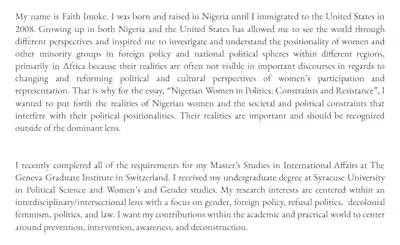Excerpt: Black Graduation and Reflections from the Class of 2023
This portion of the article was written using insights from interviews I and other members of the Black Conversations Executive Board have conducted over the course of two years.
Institutional Woes
It is, however, impossible to discuss studying at IHEID as black students without noting the inherent difficulties. As highlighted above, we have built community and we have created spaces to discuss the breadth and depth of our experiences, but these spaces are also a survival mechanism. Within the two years of pursuing a master’s degree and five years of pursuing a PhD, a black student will encounter interpersonal discrimination and institutional racism on numerous occasions.
In the Graduate Press series entitled “The Collective Experience of Black Students at IHEID”, the class of 2023 noted some of the challenges they faced while studying at the Graduate Institute. This set of four articles revealed how black students were aghast at the lack of diversity in the curriculum, the presence of only two full-time faculty members of African descent, the prevalence of microaggressions, and the tolerance of oppressive ideologies in the classroom. While the latter may also be an issue at many other institutions of higher learning, it is deeply disappointing when so much of the work in which students at IHEID seek to be involved directly affects the Global South and marginalized communities. One student noted, “There can be a lack of sensitivity when discussing Africa and African bodies when you are not from Africa” (Musumba, 2022). It is clear that, as an institution, IHEID strives to have a diverse population of students, but this diversity is hardly reflected beyond the admission level.
Perhaps this dearth of care stems from a degree of ignorance surrounding the realities of black students. And, unfortunately, this carries on to the alumni experience as well. While the Institute reports fantastic outcomes for its graduating students in the months that follow graduation, many black students belong to the non-EU/EFTA category of students for whom it is imperative to find employment to stay in Geneva. Not just any employment either, many of us require gainful employment if there is any realistic hope of continuing our professional lives within International Geneva. Yet, highly experienced students among our class have been encouraged to apply for unpaid positions within the UN system and many of the job postings made apparent to the student body are for people holding Swiss and EU citizenship. This advice shows a lack of understanding of the barriers faced by black students within the professional landscape.
Conclusion
We acknowledge the efforts made by the Institute to be committed to diversity and inclusion. However, the experiences of its black students, particularly in the class of 2023, shows that there is still a long way to go. To truly uphold this commitment, we recommend a holistic approach to diversity and inclusion. Diversity and inclusion should be evident in all aspects of academic life, including student admission, faculty recruitment, course materials, teaching practices, career advising, and welfare support. Progress in this direction is essential to decolonizing the curriculum.
We, as black students in the class of 2023, created our own spaces of freedom and resilience in our time, and those that follow us will surely do the same. We hope that the Institute will put its best foot forward as it continues to invite black scholars through the doors of Maison de la Paix. Until then, black students will continue to make light: through BC, through ASA, and through Black Graduation.
Like this project
Posted Jan 11, 2024
A reflection on the experiences of Black students at IHEID. Developed from interviews and conversations held with students over the course of two years.
Likes
0
Views
1




